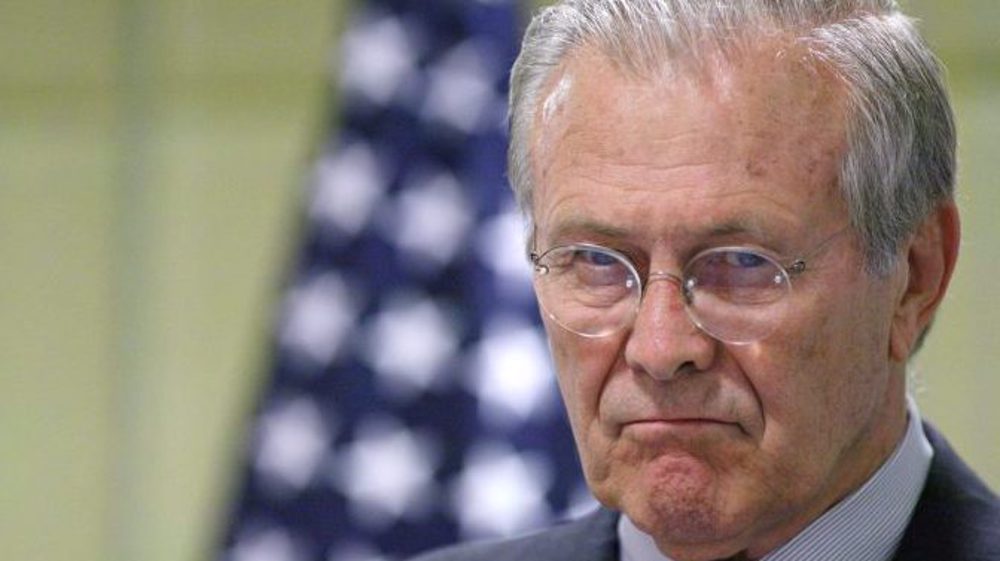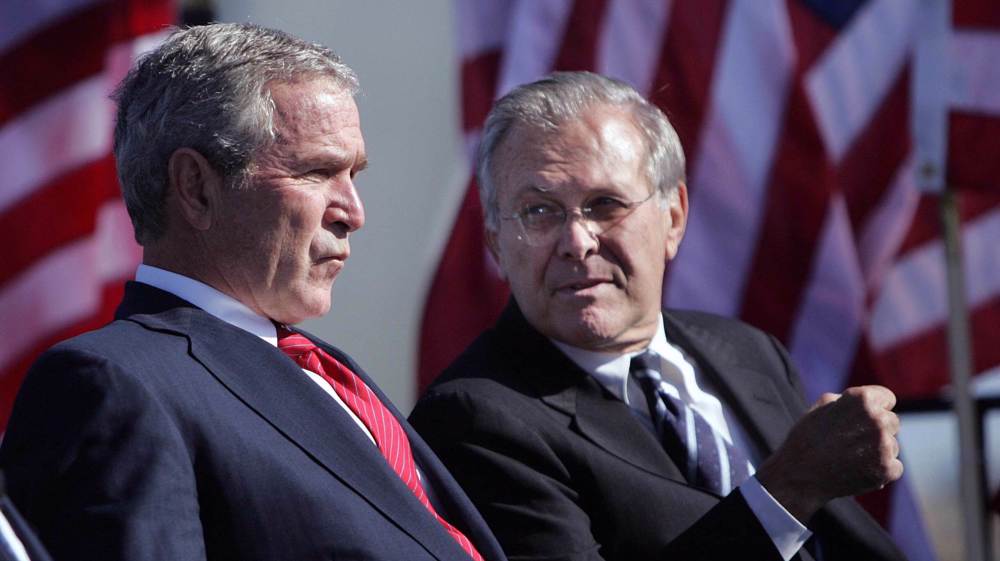Journalist: Rumsfeld leaves legacy of death and destruction
Donald Rumsfeld's legacy is “death and destruction, and a militarized American public,” American journalist Don DeBar has said, commenting on the death of the former US defense secretary who was the main architect of the Iraq war.
Rumsfeld died at the age of 88 in Taos, New Mexico, his family announced in a statement on Wednesday without specifying when he died. He was in charge of the US military for most of George W. Bush's presidency.
DeBar said, “Rumsfeld was one of the leading officials charged with the negation of what was called during the 80s ‘the post-Vietnam syndrome’- i.e., a skepticism among the American public of military adventurism in the wake of the Vietnam War, and in particular the revelations of official misconduct in connection therewith, such as was revealed in the Pentagon Papers,” which were the US military’s history of Washington’s early involvement in the Vietnam War.
“Rumsfeld, along with his counterpart on the Democratic side Zbigniew Brzezinski, helped to recondition the relationship between the government and the press, which led to a public much more willing to accept war by the time of the first invasion of Iraq than had been previously estimated. This followed a track of covert aid to rebels in Afghanistan (couched in the fiction of a Soviet invasion), to Reagan's adventure in Grenada (which was an absurdity in and of itself),” the journalist said.
“And of course there is the famous involvement of Rumsfeld in the war against Iran with a Iraq as a proxy, as well as the Contra war in Nicaragua,” he stated.
Supported by the United States and regional states, former Iraqi dictator Saddam Hussein launched a massive invasion in 1980 in a bid to seize Iran's resource-rich Khuzestan province, less than two years after the Islamic Revolution. The war continued for eight years. The Reagan administration and its special Middle East envoy, Rumsfeld, supported Saddam who used chemical weapons against Iran.
Following the attacks of Sept. 11, 2001 on the US, Rumsfeld and Bush directed the so-called War on Terror on Afghanistan, which continues today, and brought death and destruction.
Two years later in March 2003, Rumsfeld oversaw the US invasion of Iraq after he warned of a growing arsenal of Iraqi weapons of mass destruction under former Iraqi dictator Saddam Hussein, but no such weapons were ever discovered.
The war lasted to December 2011, when then-president Barack Obama ended the conflict. However, the war reignited in 2013 and saw the US heavily engaged in Iraq until 2017.
DeBar said, “When Rumsfeld returned with George Bush II in 2001, it was a short ride from Inauguration Day to the adoption of the Authorization of the Use of Military Force in October of that same year. That authorization, we now know, led to the second invasion and occupation of Iraq, the war on Afghanistan (now in its 21st year of the latest incarnation), and the invasions of Libya Syria and other hot spots in North Africa and Southwest Asia.”
“Rumsfeld's legacy is death and destruction, and a militarized American public enabling more of the same,” he concluded.
California's fires reminiscent of Israeli savagery in Gaza: Zarif
VIDEO | Press TV's news headlines
Israeli ministers discuss plot to divide Syria: Report
Pezeshkian felicitates Aoun on election as Lebanon’s president
VIDEO | Brutal murder of journalist in India prompts calls for justice
VIDEO | Iran unveils new AI drone in Great Prophet 19 military drills
110,000 Basij forces display defense capabilities in Tehran parade
VIDEO | Joseph Aoun elected as president of Lebanon











 This makes it easy to access the Press TV website
This makes it easy to access the Press TV website